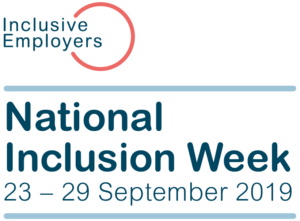This week is National Inclusion Week, an annual campaign run by Inclusive Employers to raise awareness of inclusion in the workplace.

This week is National Inclusion Week, an annual campaign run by Inclusive Employers to raise awareness of inclusion in the workplace. The campaign provides an opportunity to take stock of what we are doing to promote inclusion and how can we do it better.
What is inclusion?
Inclusion in the workplace is about ensuring that the experiences and voices of all employees are supported and valued regardless of gender, age, ability, sexuality etc. It is about valuing difference.
Why is inclusion important?
Inclusion is important as it not only ensures that individuals are engaged in their roles, it creates better performing and more resilient organisations. Employees are the biggest stakeholder of any organisation. If people feel invested in the organisation they work for, if they are happy and feel valued and supported, they will come, they will stay and they will give the best that they possibly can.
If individuals don’t feel included in their workplace, they certainly won’t be invested.
In this way, the organisation, employers and ALL employees benefit.
What is everyday inclusion?
The focus of National Inclusion Week this year is everyday inclusion. This is about ensuring that inclusion is the foundation of, and woven into, everything that we do. Once inclusion becomes fundamental, it will occur naturally in all aspects of what we do each day – rather than being something we only think about every now and then.
How does SCOAF support everyday inclusion?
SCOAF places an emphasis on being the best organisation we can be and everyday inclusion is vital to achieving that.
As a Civil Service agency, diversity is a key part of our recruitment processes and culture. However, there are a number of different initiatives that form part of our everyday culture that helps ensure we are truly inclusive. 4 key ways we achieve this are:
- Staff engagement. At SCOAF we have an employee working group that reports directly to management about issues in the workplace that either is or could potentially impact on engagement. The role of the group is to generate ideas to combat these issues. Having this come from the ground up ensures that those problems are correctly identified at an early stage and that the correct solutions are put in place. Championed by our Chief of Operations, the group has the support and resources required to effect real change and ensure that everyone’s voice is heard.
- Cross-team working. While we all have our individual roles within the organisation, we avoid silo working. Recognising that everyone brings with them a wealth of skills and experience, projects are often run across teams. This allows us to not only utilise the best of our team, and achieve better outcomes, but it provides much-needed development opportunities too.
- Flexible working. Like all modern workplaces, we understand that flexible working is imperative to ensuring an inclusive workplace. Whether on a permanent or temporary basis, we accommodate a number of different working patterns while still meeting the business need.
- Avoiding exclusion. Inclusion is ultimately about ensuring that no one feels excluded. Emphasis is put on teamwork and building a supportive work environment with a culture where each individual is invested in the work that we do. We have away days and social events that take into account issues that may arise from dietary needs, physical ability, or cultural or religious restrictions. Line managers actively work to identify where individuals are not fully participating in their roles or engagement activities and might feel excluded and then take steps to address these issues.
Although there is a lot that we already do, we recognise that it is important to not be complacent. In our quest to be the best organisation that we can be, we will continue to champion #everydayinclusion and find ways to improve how we achieve this.